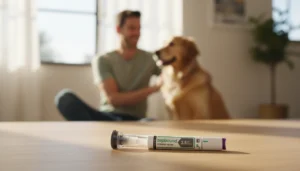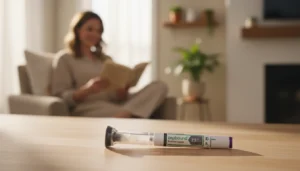Can You Go Down a Dose on Zepbound? Understanding Dosage Adjustments for Your Weight Loss Journey

Introduction
Have you ever found yourself questioning the best way to manage your medication regimen, especially when it comes to weight loss drugs like Zepbound? You’re not alone. A significant number of individuals using glucagon-like peptide-1 (GLP-1) medications face this dilemma, especially when considering dosage adjustments. It’s crucial to understand the implications of altering your dose and how to safely navigate any changes.
At TrimRx, our mission is to facilitate sustainable weight loss through personalized, medically supervised care that emphasizes science, empathy, and transparency. Today, we’re diving deep into the topic of Zepbound, a medication designed to assist with weight management, and addressing a common question: Can you go down a dose on Zepbound?
We will explore the effects of dosage changes, the proper protocol for adjusting your dose, and the importance of consulting with healthcare professionals. By the end of this article, you’ll have a clearer understanding of how to approach your weight loss journey with Zepbound, ensuring you make informed decisions that align with your health goals.
Let’s embark on this journey together, understanding both the science behind Zepbound and the best practices for managing your treatment effectively.
Understanding Zepbound and Its Role in Weight Loss
Zepbound, like other GLP-1 receptor agonists, works by mimicking the hormone glucagon-like peptide-1. This hormone plays a crucial role in regulating appetite and glucose metabolism. By acting on the brain, Zepbound helps to decrease appetite and increase feelings of fullness, making it easier for individuals to adhere to a calorie-restricted diet.
Recent studies have shown that GLP-1 medications can lead to significant weight loss in adults with obesity or those who are overweight and have weight-related health conditions. However, as with any medication, finding the right dosage is essential for maximizing benefits while minimizing potential side effects.
The Importance of Dosage in Weight Management
When starting a weight loss medication like Zepbound, healthcare providers often begin with a low dose, gradually increasing it based on the patient’s response and tolerance. This titration process is vital because it helps to minimize gastrointestinal side effects, such as nausea and vomiting, which are common with GLP-1 medications.
The standard approach involves starting at a lower dose and increasing it over time until reaching an effective maintenance dose. However, circumstances may arise where a patient might consider going down a dose—whether due to side effects, personal preference, or a desire to reassess their treatment plan.
Factors to Consider Before Adjusting Your Dose
Before we answer the question of whether you can go down a dose on Zepbound, it’s important to highlight several factors to consider:
1. Current Health Status
Your overall health and any underlying conditions can significantly influence your medication management. If you experience adverse effects at your current dose, it may be worth discussing a dose adjustment with your healthcare provider.
2. Duration of Treatment
How long you have been on Zepbound can impact your body’s response to changes in dosage. For those who have been on the medication for an extended period, a sudden decrease in dosage may lead to fluctuations in appetite and weight.
3. Consultation with Healthcare Providers
Engaging with your healthcare provider is crucial when considering any changes to your medication regimen. They have the expertise to guide you through the process safely and effectively.
4. Potential Side Effects
Understanding the side effects associated with Zepbound can help you make an informed decision. If side effects are intolerable, discussing a lower dose may be a viable option.
5. Weight Loss Goals
Your personal weight loss goals and progress should also inform your decision. If you feel you are making satisfactory progress at your current dose, it may not be necessary to adjust.
Can You Go Down a Dose on Zepbound?
The short answer is yes, but it should always be done under the guidance of your healthcare provider. Here’s why:
1. Mitigating Side Effects
If you are experiencing side effects that are impacting your quality of life, reducing your dose may alleviate those symptoms. For instance, gastrointestinal discomfort is a common side effect when starting Zepbound. A lower dose can help your body adjust more comfortably.
2. Maintaining Efficacy
While it may seem counterintuitive, some patients find that lowering their dose still allows them to maintain their weight loss progress. This can be particularly true for individuals who have reached a plateau or are experiencing diminishing returns from their current dosage.
3. Customizing Your Treatment Plan
At TrimRx, we believe in the importance of personalized care. Adjusting your dose can be part of a broader strategy to align your treatment with your unique needs and health goals.
4. Gradual Reduction is Key
If you and your provider decide that lowering your dose is appropriate, it’s typically recommended to do so gradually. This helps to minimize any potential rebound effects on appetite and weight.
Protocol for Adjusting Your Dose
If you decide to go down a dose on Zepbound, it’s essential to follow a structured approach. Here’s a step-by-step protocol:
1. Consult Your Healthcare Provider
Before making any changes, schedule a consultation with your provider. Discuss your reasons for wanting to lower your dose and any side effects you may be experiencing.
2. Establish a New Dosage Plan
Work with your provider to establish a new dosage plan that aligns with your weight loss goals and health status. This plan may involve reducing the dose gradually over a specified period.
3. Monitor Your Progress
Once you’ve adjusted your dose, keep a close eye on your weight loss progress and any side effects you experience. Documenting these observations will be valuable in your follow-up consultations.
4. Stay Engaged with Your Health Journey
At TrimRx, we emphasize the importance of ongoing support. Utilize our resources, including doctor consultations and the free assessment quiz, to stay informed and engaged in your weight loss journey.
The Role of Personalized Weight Loss Programs
At TrimRx, we understand that every individual’s journey is unique. That’s why we offer personalized weight loss programs that combine advanced medical science with compassionate support. Our approach includes:
-
Doctor Consultations: Our team of healthcare professionals is here to guide you through your weight loss journey, providing personalized recommendations based on your health status and goals.
-
Medications and Supplements: We offer a range of FDA-registered medications, including Zepbound, along with quick-access supplements like GLP-1 Daily Support and Weight Loss Boost to enhance your weight loss efforts.
-
Unlimited Support: Our dedicated team is available to support you at every step, ensuring you have the resources you need to succeed.
To explore our personalized treatment options, we encourage you to take our free assessment quiz here.
Managing Weight Loss After Dose Adjustments
After adjusting your dose, managing your weight loss journey becomes paramount. Here are some strategies to consider:
1. Monitor Your Diet
Pay attention to your nutritional intake. As you adjust your medication, you may notice changes in appetite. Focus on incorporating nutrient-dense foods, such as fruits, vegetables, whole grains, and lean proteins, into your diet.
2. Stay Active
Regular physical activity is essential for maintaining weight loss. Incorporate both aerobic and strength-training exercises into your routine to support your weight loss goals.
3. Track Your Progress
Keeping a journal of your food intake, exercise, and weight changes can provide valuable insights into how your body responds to the adjusted dosage.
4. Communicate with Your Provider
Regular check-ins with your healthcare provider will help you stay on track. Discuss any challenges you encounter, and be open about your experiences with the new dosage.
Common Questions About Zepbound Dosage
1. What should I do if I miss a dose of Zepbound?
If you miss a dose, take it as soon as you remember within four days. If it’s been more than four days, skip the missed dose and resume your normal schedule. Never take two doses in one week without consulting your healthcare provider.
2. Can I stop taking Zepbound suddenly?
It’s not recommended to stop taking Zepbound abruptly. If you need to discontinue the medication, consult your healthcare provider for guidance on how to taper off safely.
3. What are the side effects of Zepbound?
Common side effects may include nausea, vomiting, diarrhea, and constipation. If you experience severe side effects or symptoms that concern you, contact your healthcare provider immediately.
4. How often should I follow up with my healthcare provider?
Regular follow-ups are crucial, especially when adjusting your dosage. We recommend checking in with your provider at least once every month to discuss your progress and any concerns.
Conclusion
Navigating the world of weight loss medications like Zepbound can be complex, but understanding the potential for dosage adjustments empowers you to take control of your health journey. Can you go down a dose on Zepbound? Yes, but it’s essential to do so under the guidance of your healthcare provider to ensure a safe and effective transition.
At TrimRx, we are committed to providing you with the support, resources, and personalized care necessary for achieving sustainable weight loss. As you continue on your journey, remember that every step counts, and we are here to help you every step of the way.
If you’re ready to take the next step, consider taking our free assessment quiz here, and explore our range of personalized programs and quick-access supplements like GLP-1 Daily Support here or Weight Loss Boost here.
Together, let’s work towards achieving your weight loss goals safely and effectively. Your journey is unique, and we are here to support you every step of the way.
FAQ
1. How do I know if I need to lower my dose of Zepbound?
If you are experiencing persistent side effects or if your appetite or weight management goals are not being met, it may be time to discuss a dosage adjustment with your healthcare provider.
2. What happens if I take too much Zepbound?
Taking more than the prescribed dose can increase the risk of side effects. If you suspect an overdose, contact your healthcare provider or seek medical attention immediately.
3. Is it safe to combine Zepbound with other weight loss supplements?
Always consult your healthcare provider before combining Zepbound with any other weight loss supplements or medications to ensure safety and efficacy.
4. How can I manage side effects while on Zepbound?
Managing side effects can often be achieved by adjusting your diet, staying hydrated, and working closely with your healthcare provider to find the most suitable dosage for you.

Transforming Lives, One Step at a Time
Keep reading
Navigating Your Path: How Many Doses Are In Zepbound and What It Means for Your Health Journey
Curious how many doses are in Zepbound? Discover its weekly dosing schedule, available strengths, and titration process for effective weight loss. Learn more!
Navigating Your Zepbound Journey: Understanding Dosing and Expert Guidance
Wondering how to split doses of Zepbound? Learn why it’s unsafe & not recommended. Get expert guidance on Zepbound dosing for safe, effective weight loss with TrimRx. Click to learn more!
Understanding Zepbound Dosing: What is the Lowest Dose Available for Your Weight Loss Journey?
Curious what is the lowest dose of Zepbound available? Learn about Zepbound’s 2.5mg starting dose, titration, and safe use for weight loss. Get expert guidance!



